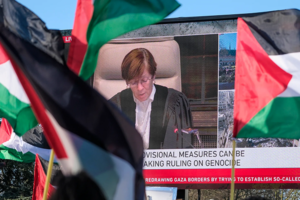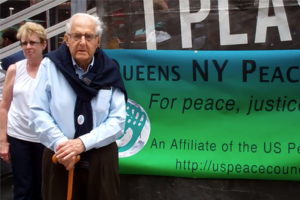Ever since the Palestinian people accepted the “Partition Resolution” of November 29th 1947 and endorsed the two-state solution, our people are still struggling for the implementation of this resolution. The part of the resolution that established the state of Israel was implemented, whereas that of the Palestinian state is yet to be embodied and materialized.
In spite of the historical injustice that had been inflicted on our people that is embedded in the “Partition Resolution,” along with the expulsion and the heavy price it suffered, this people extended its militant struggle for the cause of justice based on international legitimacy. At the top of this legitimacy comes peoples’ rights to Self-Determination in accordance, and compliance, with United Nations related resolutions, and in particular resolutions 181 and 194; the latter is on the resolution of the Palestinian refugees question.
The Palestinian people have endured recurring tragedies since 1948, especially the consequences of the 1967 war that Israel waged against Arab surrounding states. In the wake of this war Israel occupied the remaining parts of the declared, but never established, Palestinian state and a new wave of exodus marked the new era of suffering and injustice. Following this turning point, a series of wars and violence perpetrated by the Israeli military machine targeted the Palestinians, and other Arab peoples. These tragedies withstanding, the Palestinians took a historical step to achieve peace through the acceptance of the two-state principle, when the Palestinian National Council (PNC) endorsed the Palestinian Peace Initiative in 1988. The Palestinian state accepted in this respect a state on merely 22% of the total area of Palestine, while resolution 181 entitled this for state 54% of Palestine.
Following this breakthrough, negotiations between Israel and the Palestine Liberation Organization (PLO) were launched and yielded the Declaration of Principles (DOP) agreement (dubbed Oslo agreement). The DOP declared, among other things, the end outcome as the termination of the conflict and the resolution of all “final status” issues within five years from 1993. Now after more than 19 years of negotiations, and in spite of the adoption of the two-state solution by the international community (most world states, including consecutive American Presidents and the international quartet), the international community falls short of complying Israel to its own endorsements. In this regard, Presidents Obama’s speech to the General assembly of the UN in 2010 is prominent: Obama remarked his hope to witness the state of Palestine as a member of the UN within one year.
To add insult to injury, some states, the U.S.A in particular, have extended a cover-up shield for Israeli gross violations of all international laws and covenants: Israel has tremendously expanded its colonization (settlement construction) of the Occupied Palestinian Territories (OPT). According to several sources (UTCHA included) Israeli military occupation controls 62% of these territories and more that 80% of its water resources. Israeli authorities continue to build up the apartheid separation wall to the contrary of the International Court of Justice ruling that the construction of the wall is illegitimate and should be removed. Israel also wages a non-stop oppressive and aggressive campaign against Palestinians, including house demolitions, assaults on Islamic and Christian holy sites, especially in occupied East Jerusalem, and the ongoing aggression on the Gaza Strip, including isolating it in a blockade and targeting its citizens by military attacks day in and day out. All of which violate, as well, Israel’s own commitments to the PLO as agreed upon, including the Road Map plan.
The Palestinian leadership has realized that negotiating with Israel revolves in closed circle, and that Israeli governments manipulate it to provide a smokescreen for its policies in the OPT, that aim at establishing de facto situation to compromise the final status agreement. Israeli strategy leads to the prevention of the two-state solution and to inflicting more suffering upon our people. The Palestinian leadership refrained from negotiating with the Israeli government under these circumstances; it asserts the condition of halting all colonization (settlement) activities to resume the negotiating process, in addition to the demands of releasing the Palestinian prisoners, and defining the reference to the process as the implementation of international resolutions relevant to the conflict.
All efforts that the U.S.A administration and the Quartet claimed to have expended in order to create the appealing conditions for the resumption of the process came to a dead-end: Israeli intransigent refusal to abide by international law. For these reasons the Palestinian leadership decided to take the whole cause to the international institutions in 2011, demanding that the Security Council of the UN vote on the attendance of Palestine (within the 1967 borders and Jerusalem as its capital) as a member state of the UN. The Palestinian plea was faced with firm rejection by the U.S.A, Israel, and their allies. The U.S.A resorted to all sorts of pressure and waged threats against Security Council member state to prevent any deliberations on the plea. These threats succeeded, unfortunately.
The Palestinian leadership has been re-evaluating the current day political circumstances, including the serious threats emanating from Israeli policies, especially the fear of a new Nakba (catastrophe) — a threat that, if materialized, would put the whole region in a deep ordeal. This stipulation withstanding, the Palestinian leadership would again extend a plea to the UN General Assembly to endorse the attendance of Palestine as a non-member state in the UN system of states in order to preserve the historical rights of the Palestinian people and to salvage the fading two-states solution.
We hereby appeal to all forces of peace and justice in the world, human rights and the right of self-determination advocates, all democratic and progressive organizations, and solidarity movements to raise their voices in support of Palestinian rights and to apply necessary pressures in their disposal to compel their governments to support justice. The least those governments may offer is a vote in favor of a Palestinian state in the UN as the Palestinian plea demands.
We have confidence that your solidarity with and support for the justice of the Palestinian cause would be transformed, once again, into practical steps that contribute to the foundation of peace, right, and justice in the Middle East for a better future to all peoples in this region, amongst which the Palestinian people.
Expatriate Affairs Department
Palestinian of Liberation Organization
Ramallah, Palestine
____________________




